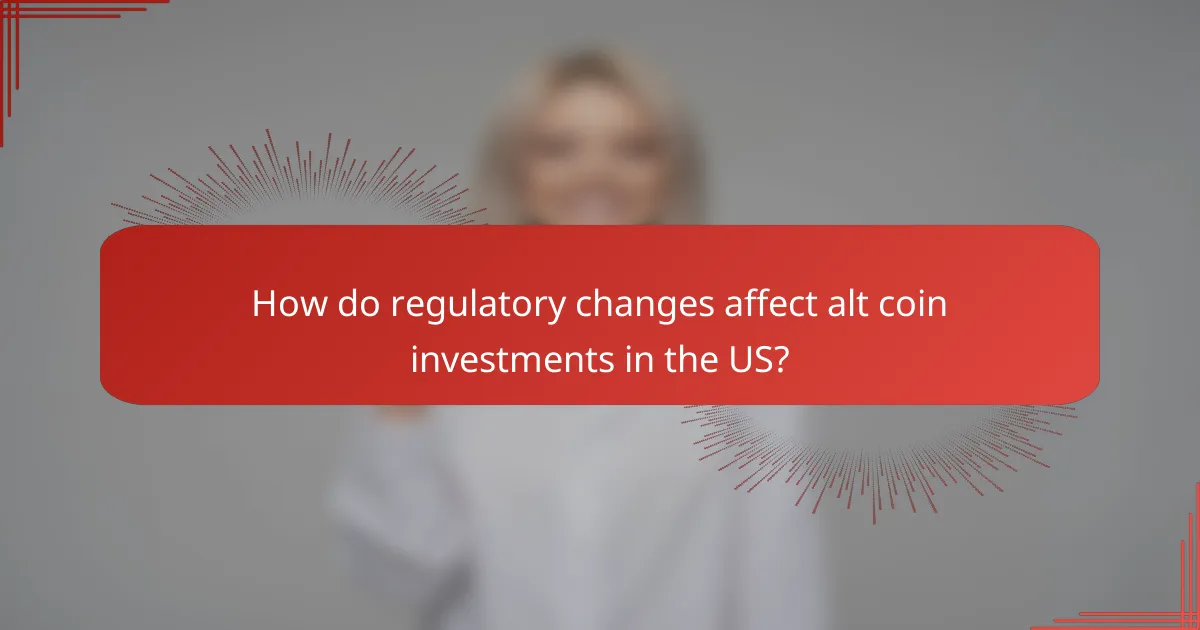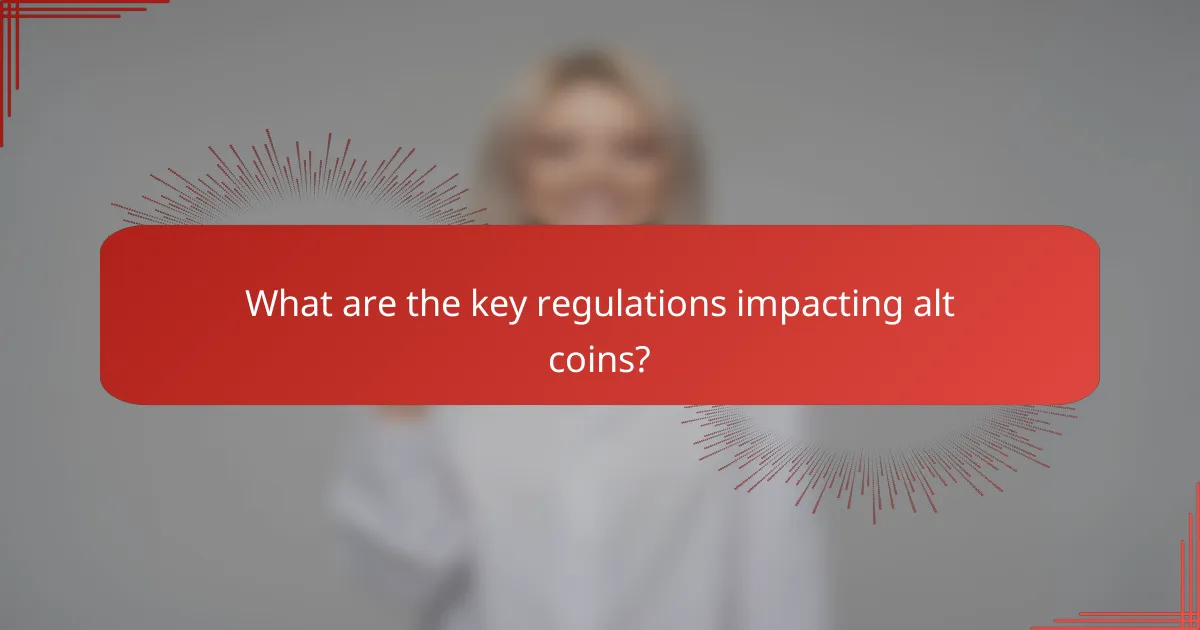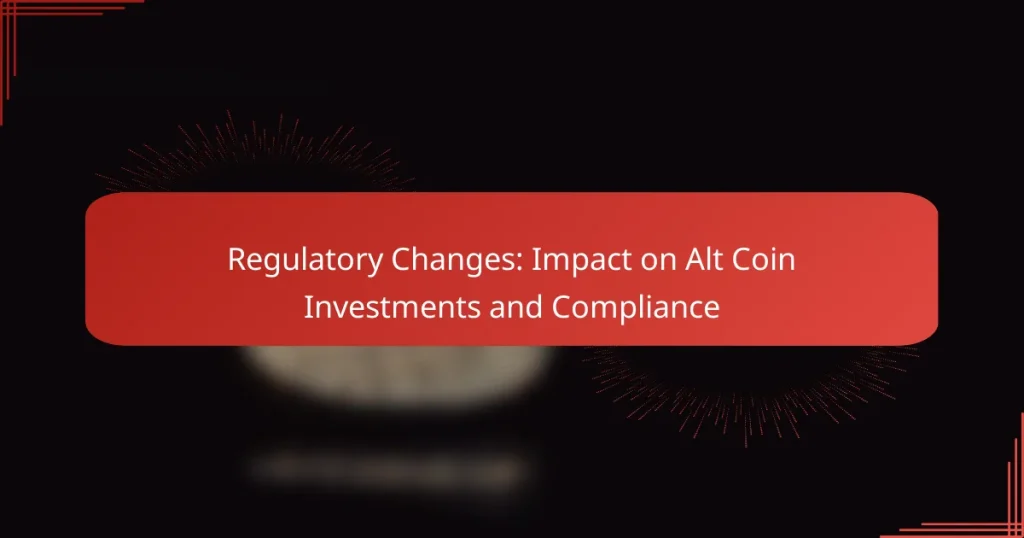Regulatory changes play a crucial role in shaping the landscape of alt coin investments, impacting compliance requirements and investor sentiment. Staying informed about guidelines from regulatory bodies like the SEC and FinCEN is essential for investors to navigate these shifts effectively and ensure adherence to evolving market dynamics.

How do regulatory changes affect alt coin investments in the US?
Regulatory changes significantly influence alt coin investments in the US by altering compliance requirements, investor sentiment, and market dynamics. Investors must stay informed about these shifts to navigate the evolving landscape effectively.
Increased compliance requirements
New regulations often lead to stricter compliance requirements for alt coin projects, which can include registration with regulatory bodies and adherence to anti-money laundering (AML) practices. This can increase operational costs for projects, potentially impacting their viability and attractiveness to investors.
For example, projects may need to implement Know Your Customer (KYC) protocols, which can deter some users due to privacy concerns. Investors should assess whether a project can meet these compliance demands without sacrificing innovation.
Impact on investor confidence
Regulatory clarity can enhance investor confidence, as clear guidelines help reduce uncertainty around the legality of alt coin investments. Conversely, sudden regulatory changes can lead to panic selling and decreased trust in the market.
For instance, if a major regulatory body announces a crackdown on certain alt coins, investors may quickly withdraw their funds, leading to sharp price declines. Staying informed about regulatory developments is crucial for maintaining confidence in alt coin investments.
Changes in market volatility
Regulatory changes can lead to increased market volatility for alt coins, as new rules may cause rapid shifts in supply and demand. When regulations are introduced or modified, traders often react quickly, resulting in price fluctuations.
For example, a favorable regulatory announcement might lead to a surge in prices, while negative news could trigger sell-offs. Investors should be prepared for such volatility and consider strategies like dollar-cost averaging to mitigate risks associated with sudden market movements.

What are the key regulations impacting alt coins?
Key regulations impacting alt coins include guidelines from the Securities and Exchange Commission (SEC), rules from the Financial Crimes Enforcement Network (FinCEN), and various state-level regulations. These regulations shape how alt coin investments are structured, marketed, and traded, influencing compliance requirements for investors and issuers alike.
Securities and Exchange Commission (SEC) guidelines
The SEC regulates securities transactions in the United States, which can include certain alt coins if they are classified as securities. This classification depends on factors such as the investment contract’s nature and the expectation of profits derived from the efforts of others.
Investors should be aware that if an alt coin is deemed a security, it must comply with registration requirements, which can involve significant costs and regulatory scrutiny. Non-compliance can lead to penalties, including fines or restrictions on trading.
Financial Crimes Enforcement Network (FinCEN) rules
FinCEN requires entities dealing with alt coins to register as money services businesses (MSBs) if they facilitate transactions involving virtual currencies. This registration mandates compliance with anti-money laundering (AML) and know your customer (KYC) regulations.
Investors should ensure that any platform they use for alt coin transactions adheres to these rules to mitigate risks associated with fraud or illicit activities. Failing to comply with FinCEN regulations can result in severe penalties and loss of access to services.
State-level regulations
In addition to federal regulations, many U.S. states have their own laws governing alt coins, which can vary significantly. Some states require specific licenses for cryptocurrency businesses, while others have more lenient approaches.
Investors should research the regulations in their respective states to understand any additional compliance requirements or restrictions. For instance, states like New York have stringent licensing requirements under the BitLicense framework, while others may have minimal oversight.

What compliance measures should alt coin investors adopt?
Alt coin investors should implement several compliance measures to align with regulatory standards and mitigate risks. Key areas include Know Your Customer (KYC) protocols, Anti-Money Laundering (AML) practices, and tax reporting obligations.
Know Your Customer (KYC) protocols
KYC protocols require investors to verify their identity before engaging in transactions. This process typically involves submitting personal information, such as name, address, and identification documents, to the exchange or platform.
Investors should ensure that the platforms they use have robust KYC procedures in place. Failing to comply with KYC requirements can lead to account restrictions or legal penalties.
Anti-Money Laundering (AML) practices
AML practices are designed to prevent illicit activities, such as money laundering and fraud, in the cryptocurrency space. Investors should be aware of the AML policies of the exchanges they use, which often include transaction monitoring and reporting suspicious activities.
To comply with AML regulations, investors should maintain clear records of their transactions and be cautious of any unusual trading patterns. Engaging with platforms that adhere to AML guidelines can help mitigate risks.
Tax reporting obligations
Tax reporting obligations for alt coin investments vary by country, but generally, investors must report capital gains and losses on their tax returns. In the United States, for example, the IRS requires reporting of cryptocurrency transactions, treating them as property for tax purposes.
Investors should keep detailed records of their trades, including dates, amounts, and transaction values, to simplify tax reporting. Consulting with a tax professional familiar with cryptocurrency regulations can provide additional guidance and ensure compliance.

What are the risks of non-compliance for alt coin investors?
Non-compliance for alt coin investors can lead to significant financial and reputational repercussions. Investors may face legal penalties, miss out on lucrative opportunities, and suffer damage to their reputation in the crypto market.
Legal penalties and fines
Investors who fail to comply with regulations may incur hefty legal penalties and fines. Depending on the jurisdiction, these fines can range from hundreds to millions of dollars, particularly if the investment is deemed fraudulent or unregistered.
Regulatory bodies, such as the SEC in the United States or the FCA in the UK, have been increasingly vigilant in enforcing compliance. Investors should familiarize themselves with local laws to avoid potential legal issues.
Loss of investment opportunities
Non-compliance can lead to missed investment opportunities, as many exchanges and platforms require verification of compliance before allowing transactions. This can restrict access to promising alt coins that are not available on non-compliant platforms.
Additionally, regulatory changes can create new investment avenues that compliant investors can exploit, while non-compliant investors may find themselves sidelined. Staying updated on regulations can help investors seize these opportunities.
Reputational damage
Investors who are found to be non-compliant risk significant reputational damage. This can affect their standing within the crypto community and deter potential partners or investors from engaging with them.
Reputation in the cryptocurrency space is crucial, as trust is a key factor in attracting investment. Maintaining compliance not only protects an investor’s financial interests but also preserves their credibility in a rapidly evolving market.

How can investors stay informed about regulatory changes?
Investors can stay informed about regulatory changes affecting alt coin investments by actively following reliable sources and engaging with the community. Staying updated is crucial for making informed decisions and ensuring compliance with evolving regulations.
Following industry news outlets
Regularly checking reputable industry news outlets is essential for staying informed about regulatory changes. Websites like CoinDesk, CoinTelegraph, and The Block provide timely updates and in-depth analysis of new regulations impacting the cryptocurrency market.
Setting up alerts for specific keywords related to alt coins and regulations can help investors receive immediate notifications about significant changes. This proactive approach ensures that investors are not caught off-guard by sudden regulatory shifts.
Joining cryptocurrency advocacy groups
Joining cryptocurrency advocacy groups can provide investors with valuable insights and updates on regulatory matters. Organizations such as the Blockchain Association and Coin Center often engage with policymakers and offer resources that keep members informed about legislative developments.
Participating in these groups also allows investors to network with like-minded individuals and share information about compliance strategies. This community engagement can enhance understanding of the regulatory landscape and its implications for alt coin investments.
Utilizing compliance software
Utilizing compliance software can streamline the process of staying compliant with regulatory changes. Tools like Chainalysis and Elliptic help investors monitor transactions and ensure adherence to relevant regulations, reducing the risk of penalties.
Investors should evaluate different compliance solutions based on their specific needs, such as transaction volume and the types of alt coins they are investing in. Many software options offer features like real-time alerts and reporting capabilities, which can significantly aid in maintaining compliance.

What are the emerging trends in alt coin regulation?
Emerging trends in alt coin regulation focus on increased scrutiny and the establishment of clearer guidelines for investors and issuers. Regulatory bodies worldwide are adapting to the rapid growth of cryptocurrencies, aiming to enhance transparency and protect investors while fostering innovation.
Increased Regulatory Scrutiny
Regulatory authorities are intensifying their oversight of alt coins, driven by concerns over fraud, market manipulation, and consumer protection. This scrutiny often results in more rigorous compliance requirements for exchanges and projects, including Know Your Customer (KYC) and Anti-Money Laundering (AML) protocols.
For instance, in the European Union, the Markets in Crypto-Assets (MiCA) regulation aims to create a comprehensive framework for digital assets, ensuring that alt coin projects adhere to specific standards. Investors should stay informed about these developments to avoid potential legal pitfalls.
Standardization of Compliance Practices
As regulations evolve, there is a push towards standardizing compliance practices across different jurisdictions. This standardization helps create a more predictable environment for alt coin investments, making it easier for investors to navigate the regulatory landscape.
For example, many jurisdictions are adopting similar reporting requirements for token issuers, which can include disclosures about project goals, risks, and financial health. Investors should look for projects that prioritize transparency and adhere to these emerging standards.
Focus on Consumer Protection
Consumer protection is becoming a central theme in alt coin regulation, with authorities aiming to safeguard investors from scams and misleading information. This focus may lead to stricter penalties for non-compliance and fraudulent activities.
Investors should be cautious and conduct thorough research before engaging with alt coin projects. Verifying the legitimacy of a project through its whitepaper, team background, and community feedback can help mitigate risks associated with potential scams.

